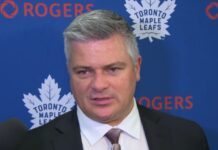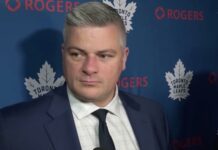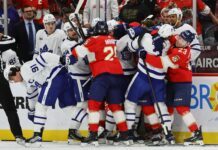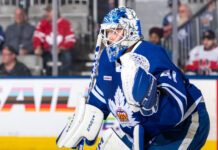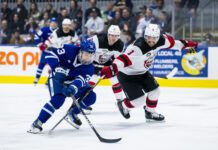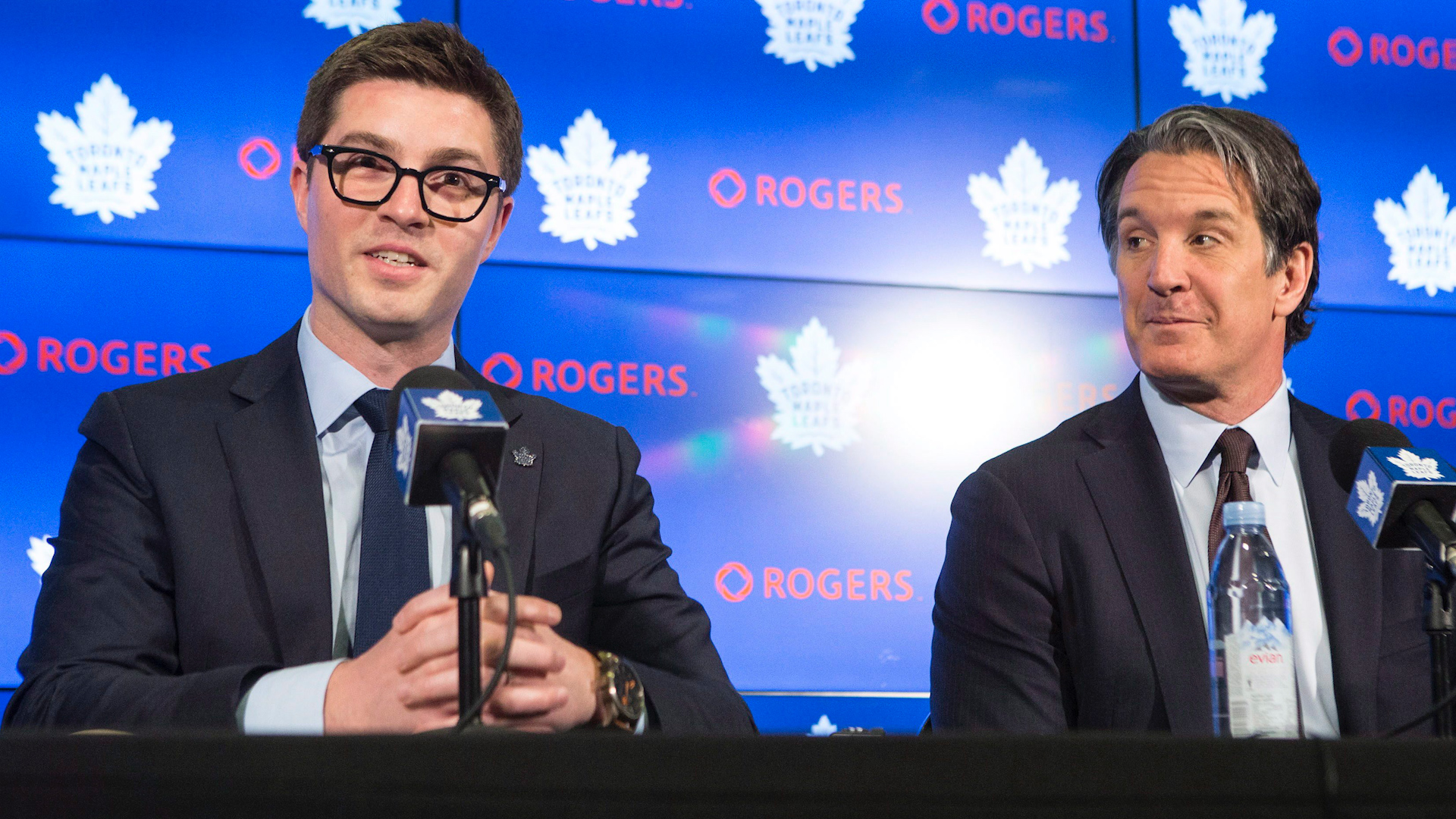Kyle Dubas joined TSN Overdrive on Wednesday evening, discussing the pitch to John Tavares, the process of waiting for the decision, the cap situation going forward, whether or not he’ll address the defense, and more.
The country and the hockey world found out that Tavares was going to be a Leaf at around one o’clock. There was a lot of anticipation, but he did it in a uniquely 2018 way. He posted a few tweets and made the announcement and said what he said about the Islanders. At what point throughout the process were you aware that he committed to being a Maple Leaf?
Dubas: It’s interesting. Even late Saturday night, we did not know. Very, very late Saturday. We had no discussion with them whatsoever about a contract or anything like that. On late Saturday night, I had a call from John that he had made up his mind after the interview period and wanted to come to Toronto. Obviously, we talked to Pat after it struck midnight and began to try to put everything together, which is not always simple. We are lucky here to have Brandon Pridham and Laurence Gilman, who have a lot of experience on that front, work with Pat Brisson at CAA to get it all set and done. One of John’s wishes was that he was able to announce it on Twitter because it was a difficult decision and he wanted to thank the fans of the Islanders and the organization. We were very willing to concede that part of the negotiation in order to get him here. Obviously, we are happy with how it played out for us.
Saturday night, you are waiting for a call. You said Tavares called you personally, right?
Dubas: Yes, that’s right.
In terms of the contract, did you guys have an idea of the numbers? It’s not like you were sitting there going, “We were thinking three years at $5.5 million here.” You must’ve had a pretty decent idea of what the ballpark was going to be.
We kept it about hockey and who we are as a program, and we knew that if he decided this was where he wanted to be, the contract part would not be overly difficult to work on.
Dubas: You hear from the rumours of what is out there, and in this case, you hear about it from other teams. Our strategy was that we did not want to talk about the contract or the numbers with them until after Saturday because we felt that we needed to have John know that he wanted to be a Maple Leaf and come to Toronto before we started to have that actual discussion. To get through that part – which was the big part – I wasn’t worried that we wouldn’t be able to make the contract work between our camp and John’s and Pat Brisson at CAA. The primary goal from us, from the minute we knew we were going to be a part of the interview process with them, was that we needed to present to John who we were and what we had become over time with the Leafs and where we were going, and what his role could be in helping us get to where we all want us to get. That was the way that we handled it and those were the tactics that we used. We kept it about hockey and who we are as a program, and we knew that if he decided this was where he wanted to be, the contract part would not be overly difficult to work on.
You made your pitch to John Tavares, and he told us yesterday he was very impressed by it. We’ve heard that you were impressed with what he came back with. What was he asking you and what did he want to know?
Dubas: In all of the discussions – some of them have been higher profile than others – he was very direct. He had a list of questions and you could tell he was very, very prepared personally for the process. A lot of times, whether it’s agent driven or representative driven or player driven, the agents are the ones that I found usually ask the difficult questions, either in these types of meetings or over the phone. But John — which I was very, very impressed by — was driving the bus there. You could tell that Pat and the group at CAA had prepared him very well in terms of educating him on the teams and what their situations were. John wanted to know everything about our team. He wanted to know about our roster, where we were going, how we were going to continue to improve it, what we did on the development side, what our plan was to move it forward and keep the group together. He was very, very specific with the questions and very well prepared. That was very impressive for me because it was the first time that we had ever been in one of those scenarios where you could tell the player was the one who had been very meticulous in his preparation when meeting with the team.
The CAA group and Tavares gave all six teams upwards of three hours to make their pitch. You guys were out of there in just over two. It’s almost like writing an essay, and once it is handed in, there is nothing you can do. How often did it pop into your mind that you should’ve said this or should’ve said that in the meeting – that I forgot this, that, or the other?
Dubas: It was interesting because, and I said this a few times, this was the first process that I had personally been through since interviewing for the Sault Ste. Marie job where you walk out and you think you did well and you think you were well prepared, but you really didn’t have a great feel for how the other side received it or interpreted it. It was the exact same feeling as in 2011 when I went into the Soo to meet with the board of directors with the Greyhounds. You go through the next two days where you don’t have any indication of how you did. You don’t see any media reports. You don’t have a lot from them as they were going through their interviews with the other teams that would give you an indication of how you did or how it went over.
Mike went back to Detroit but Brendan and I stayed in LA for the next couple of days just in case we were called back by chance. You go through everything again from top to bottom. “We could’ve done this or that,” or, “We should’ve said this or that, or not talked about this as much.” As it kind of went on and the week went on, we grew more and more confident that we at least made a good impression and that they would want to have some more discussion with us later in the week. That kind of puts that at ease and you just sort of give up control to them. They had earned that right. I am happy that it played out the way that it did.
You guys went first, right?
Dubas: That’s correct, yeah.
Did you think maybe that you’ve got to go first and there are going to be five other things after us… did you kind of think, by the time the last presentation comes, “Does he remember the first one?”
Dubas: We didn’t get to pick. We were just told, “Hey, you are invited to the dance and you are going to be dancing first.” We weren’t going to try to finesse when we went, so they told us we were on Monday. We got prepared and we were prepared and then we got everybody in and had some time – myself, Mike and Brendan – to go through the points we wanted to make and make sure that they understood clearly and we could address their questions about our program. And then you always think, “Oh geez, we should’ve gone last and left a last impression.” We went first this time. Going back to my experience in the Soo, my interview was first and I had the same feeling after not knowing one way or the other. That seems to have worked so far.
But the same thing came into our mind. You’d see on Twitter another team rolling up and you’re worried, “Geez, what could they have presented that is better than us?” You go through the whole range of emotions throughout the entire week. It was interesting, to say the least.
Didn’t you guys end up on the same flight as him coming back?
Dubas: I did not.
Brendan did, didn’t he?
Dubas: I’m not 100% sure. I know I was not on the same flight as John.
How much of the “hometown kid coming home” narrative did you rely on with your pitch?
Dubas: Not a whole lot. It was more where we were at as a program and how he would fit into it. I think, obviously, the fact that it is home for him would’ve played into John’s mind. Clearly, as he explained on Sunday to the media, it did weigh on him. At the end, as he said in his tweet, not many people get to live out their childhood dream, or something in that vein. He grew up a Leaf fan, grew up playing his later years in minor hockey for the Marlies. Him and his fiancé’s families are here. We didn’t try to play on it too much. We more tried to say, “Here is who we are as hockey program and here is how we can help you reach your objectives in hockey.” The hometown stuff – I think that is more of a personal part that we left for John and his family and their camp at CAA.
The business side of this is the salary cap and working it all out. What comes with this contract is a big commitment – $11 million per over seven years. You’ve got a bunch of RFAs coming up; some big RFAs, William Nylander currently being one of those. Matthews and Marner are just around the corner. How do you juggle this? How do you make this work? How does it affect your cap strategy moving forward?
Our cap situation is very favourable to us to keep this thing rolling ahead while also being able to adapt to different needs we may find as we get on down the path and reach subsequent seasons and offseasons.
Dubas: What I would say is that there won’t be much juggling. Before we even engaged in the process with John, we didn’t think it would be fair to John to have him come in and then in subsequent years have to lose those players that you are referring to. We went through a very stringent process internally where we went through it over and over and pored over it in every way that we possibly could, imagining every possible scenario, to ensure that — regardless of different variables that interject themselves into this process — we are going to be able to keep that core of our team together while also remaining fairly flexible and being able to add players to it.
I don’t think there will be any juggling. That is part of what we felt we had to convey to them: Our cap situation is very favourable to us to keep this thing rolling ahead while also being able to adapt to different needs we may find as we get on down the path and reach subsequent seasons and offseasons. We feel very good about that.
We are going to be very patient with the RFAs that you are alluding to. William’s contract is up now and we will begin with Lewis Gross, his representative here, in the coming weeks to make sure he is set. And then we will tackle the others that need extensions. For me, it’s my own decision that we have got to be patient with them. The players should know what they are getting into as well and our vision for the team so that they feel a part of that if they are going to be signing up for the long term for us.
Nylander has to be signed before the start of the year. Would you like to take a run at getting Matthews and Marner done before the start of the year as well?
Dubas: I think that we will work with their representatives and at least open discussions. There is no rush from my end, and that’s my own decision to just be patient with them. They are all going to be a part of this program for a long time. We want them to be acutely aware of where we are going and what they are getting into so that they feel as much a part of it as they can if they are going to sign for the vast majority of their careers to be Maple Leafs. We will begin that process individually with each of them as we get rolling, but there is no rush or panic on my end to get those done by a certain date or time. It is patience and doing it when it is right for the players and for us. We will begin that process, but we will be very, very patient with it. I wouldn’t expect any imminent news on either of those fronts.
You know the way this market works. You land Tavares and everyone is ecstatic, and then the dust settles and it’s, “Okay, what is coming next? What is the next move?” Up front, you are loaded. You have a very good number-one goalie and a very good coach. The focus seems to be on the defensive side of things. We talk about it a lot on this show. Quite frankly, your defense probably gets over criticized, to be honest. How would you assess your defensive structure and your six guys on your defense as of today, and what the plan might be leading up to opening night?.
I am probably more bullish on our defense than others… I’ve got a lot of faith in our defense.
Dubas: I am probably more bullish on our defense than others. I get asked about it every time someone talks to me, so I am aware that it is a cause for angst with our fan base and amongst the pundits. That’s fine. I understand why people want to talk about it. I’ve got a lot of faith in our defense this year, with Nikita Zaitsev being healthy, Ron Hainsey going into his second year with the team, and Travis Dermott ascending from the Marlies. Obviously, we’ve got Morgan and Jake here. I like our defense. The key for us is that we are continuing to make plays from the backend and can move the pucks to our forwards. I think all of the guys have the ability to do that.
Having spent every day with the Marlies for the past number of years, particularly this year as the team went on a run that ended with the team winning, you see what a guy like Martin Marincin is capable of doing as he gained more and more confidence as the year went on, and Justin Holl, Calle Rosen, Andreas Borgman, and on and on at that level. I am excited for our D. I think the guys we have on the way can make a lot of plays and also defend very well. We’ve got Igor Ozhiganov coming in from Russia as well and Connor Carrick back.
I like our D more than most. I believe they all have the ability to make plays in our zone and make plays in the offensive zone. If we find during the year that we need to add to it and there is something that will put us over the top, we’ll have the cap space to do that in season. I don’t worry about that as much as others and I’m really confident in our D with DJ Smith coaching and developing them.



